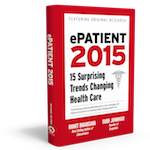I’ve previously discussed the health revolution that’s been initiated by the super-convergence of several key macro digital technologies and technology-based trends with healthcare and consumers.
I’ve previously discussed the health revolution that’s been initiated by the super-convergence of several key macro digital technologies and technology-based trends with healthcare and consumers. But many in the life sciences and healthcare industries have asked: “What are the ultimate health benefits?” It’s a great question since, beyond the hype and flurry of investments (tripling this year vs. the same period in 2011), we are still waiting to see large scale measurable health-related outcomes that are attributable wholly or in part to the combined application of digital health solutions.
In order to gauge the sentiment of professionals working at the forefront of digital health innovation I polled the members of my Digital Health group on LinkedIn: “What is the biggest human health benefit from using digital health?”
- Disease management – 50%
- Disease prevention – 30%
- Disease diagnosis – 11%
- Disease prediction (especially genomics) – 7%
- Reduced radiation exposure (imaging) – 3%
According to the poll (which received more than 325 responses as of July 16), half of the total respondents felt that the most significant, near-term benefit will come from improved disease management. For long-term benefits, approximately one third of respondents indicated that disease prevention was the greatest opportunity.
In considering the supporting evidence that already exists for the survey results, we’re already seeing some improvements in disease management from the use of digital health tools such as access to caregivers and laboratory results via online resources to delivering cardiac, rheumatology, and infectious disease care (and even psychiatric consultation) to patients in remote areas, as noted in previous posts by our guest blogger Dr. Dale Alverson. Moreover, many diabetics use glucometers and even pedometers to better monitor and manage their diabetes.
While it came in second, disease prevention could ultimately provide the largest benefit arising from use of digital health tools. After all, if we don’t become patients because we’ve used information to prevent disease, or exchanged testing information that presented a warning sign to future disease, digital health can stave off healthcare’s greatest costs: disease care. In addition, using solutions like 23andME and Pathway Genomics for personal genomics-based probabilistic disease prediction is a powerful, but mostly overlooked opportunity for digital health to make a significant difference in improving our health. If more consumers catch on to using these tools, and integrate them with additional digital health devices and services, they could further catalyze the digital health revolution.
Personally, I think both disease management and prevention will be equally important as more information becomes available through digital means. While basic health management and improvement augmented by digital tools and information is probably the biggest aspect of digital health disease prevention, in one amazing dual-opportunity, Dr. Eric Topol, author of The Creative Destruction of Medicine: How the Digital Revolution Will Create Better Health Care, recently described a scenario where we might one day intervene to prevent heart attacks just days before they occur: ”In the long term… we could put it in a nanosensor that is embedded into a tiny vein in high risk people who are most vulnerable to having a heart attack, and have that sensor talk to their cell phone, so they get an alert that they might have a heart attack in a few days.”
Going forward, we’ll hopefully see a transition from the short term disease management opportunity to a more robust disease prevention effect, which will bend the healthcare cost curve while greatly increasing the quality of life for consumers.
Given this rapidly evolving convergence of technology with health and medicine, what do you think are the biggest short-term and long-term health benefits afforded by the digital health super-convergence? Are there any that I missed in the “answer” options (one I thought about subsequently is aging in place)? Will use of genomic information by consumers seeking to prevent disease become mainstream? Please join in the conversation by commenting below and by submitting your own vote in the Digital Health group poll.





